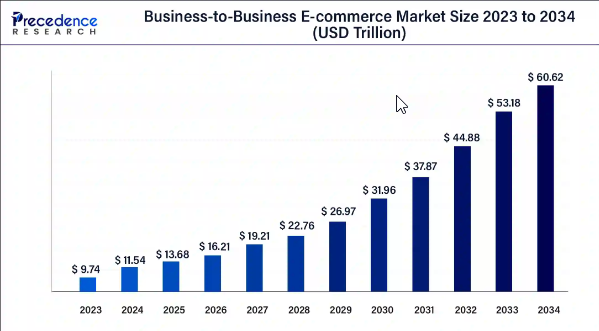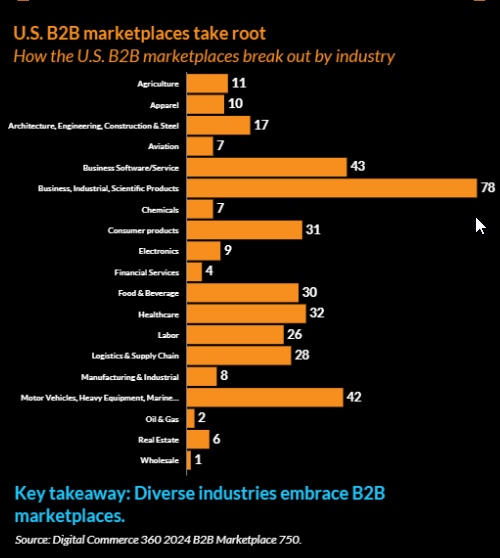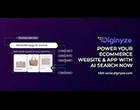
B2B eCommerce platforms are revolutionizing the way businesses operate, and if you're not already embracing this technology, you might be missing out on substantial growth opportunities. In today’s digital age, B2B buyers expect seamless, efficient, and personalized shopping experiences mirroring the B2C sector. Based on industry analysis in 2024, the global B2B e-commerce market was valued at approximately USD 11.54 trillion. It is expected to expand significantly, reaching around USD 60.62 trillion by 2034, with an estimated compound annual growth rate (CAGR) of 18.04% over the forecast period.

Source: Precedense Research
What is a B2B eCommerce Platform?
A B2B eCommerce platform is an online marketplace or system designed specifically for businesses to conduct transactions with each other. Unlike B2C platforms, B2B systems focus on bulk transactions, detailed product catalogs, and multi-tiered pricing options. Companies use these platforms to streamline processes, automate orders, and provide better service to their clients. This is essential in an increasingly digital world where B2B buyers prefer digital channels over traditional methods.
Why Businesses are Switching to B2B eCommerce Platforms?
The Rise of Digital Convenience: Today’s buyers expect the same convenience they experience in their personal shopping habits. Research shows that 73% of B2B buyers want a personalized, B2C-like online shopping experience. This calls for advanced eCommerce ERP that offers real-time inventory updates, flexible payment options, and personalized product recommendations.
Boost in Sales and Efficiency: Companies that implement eCommerce platforms for B2B report significant boosts in revenue. Statistics reveal that platforms offering tailored product suggestions can see a 26% increase in sales. Furthermore, B2B organizations with robust and AI-driven eCommerce solution are 1.5 times more likely to achieve revenue growth compared to those without a digital presence.
Personalization and AI Integration: AI-driven personalization is becoming a game-changer in B2B eCommerce. By leveraging artificial intelligence, platforms can provide customized product recommendations and pricing, leading to increase in revenue for businesses that invest in these technologies. AI not only enhances user experience but also automates administrative tasks, freeing up time and resources for companies to focus on strategic growth.
Also Read: Revolutionizing eCommerce with AI-Powered Hyper-Personalization
The Key Features of a Robust B2B eCommerce Platform
When choosing a B2B eCommerce platform, consider these critical features like:
Scalable Architecture: As your business grows, your platform should be able to handle increased traffic and a larger inventory. With a scalable infrastructure, your site can maintain peak performance regardless of traffic levels.
Multi-Channel Integration: Modern B2B buyers use various digital channels to conduct their research and make purchases. It was reported that B2B transactions involved multiple touchpoints, such as websites, mobile apps, and social media platforms. Ensuring that your platform integrates seamlessly with these channels is essential for a cohesive customer experience.
Personalization and Automation: A platform that supports AI and machine learning can automate personalized eCommerce marketing, manage dynamic pricing, and provide relevant product suggestions. Studies show that more B2B businesses are investing in eCommerce personalization to enhance user engagement.
Also Read: How automation can enhance the performance of an eCommerce business
Omnichannel Experiences: B2B buyers increasingly expect seamless experiences across all touch points. Omnichannel commerce, where interactions and transactions happen fluidly between mobile apps, websites, and even physical locations, is projected to dominate B2B strategies moving forward. The B2B market is forecasted to grow by leaps and bounds in coming future, driven largely by companies adopting this comprehensive approach.

Source: Digital Commerce 360
Marketplaces on the Rise: B2B marketplaces, akin to Amazon for businesses, are becoming crucial sales channels. In 2023, 12% of B2B sales in the U.S. were made through these marketplaces, and the number of available B2B platforms is expected to increase tenfold by 2025.
Mobile-First Approach: With mobile eCommerce anticipated to comprise all eCommerce by the end of 2024, it’s clear that businesses need mobile-optimized eCommerce platforms. Mobile-friendly interfaces, quick loading times, and easy navigation are now non-negotiable if you want to capture the growing segment of mobile B2B shoppers.
Also Read: 10 Key Features to Look for in a B2B eCommerce Platform
Why B2B eCommerce Platforms are Essential for Modern Businesses
Adopting a B2B eCommerce platform isn’t merely following trends it’s essential for staying competitive. According to multiple market studies, B2B buyers plan to conduct over half of their purchases online in the coming year. This shows a clear shift in buyer behavior, emphasizing the need for digital transformation. Companies that fail to adapt risk losing their customer base to competitors that offer better online experiences.
Additionally, B2B buyers prefer to complete transactions online without interacting with a sales representative. This means that businesses must focus on building platforms that provide comprehensive product information, AI-powered intelligent chatbots, intuitive search capabilities, and efficient self-service options. Companies that integrate these features often see a 20% increase in order size, highlighting the direct correlation between platform capabilities and sales growth.
Conclusion:
The future of B2B commerce is digital, and the businesses that thrive will be those that embrace the power of AI-driven eCommerce platforms. By investing in robust, AI-powered B2B eCommerce platform like Diginyze, you not only align with the needs of modern B2B buyers but also position your business for sustainable growth. As the market continues to evolve, staying ahead of trends like mobile optimization, omnichannel strategies, and marketplace integration will be crucial to maintaining a competitive edge.
The B2B eCommerce landscape is more dynamic than ever, and those ready to adapt will be the ones reaping the rewards. So, if you're not yet leveraging an eCommerce platform, now is the time to dive in and harness the full potential of digital transformation for your business.
To know more about Diginyze book a FREE DEMO now.
Recent Blogs
Explore latest insights and trends in technology and eCommerce.
Case Studies
Your Digital Transformation Starts Here!
Join thousands of businesses transforming with Diginyze. Sign up today and start now!


























